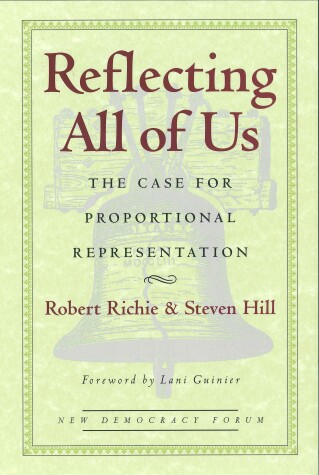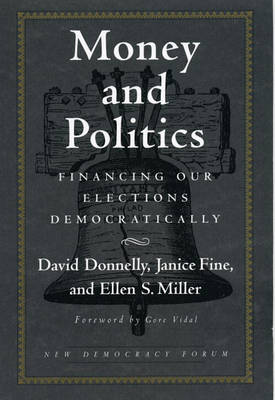New Democracy Forum
3 primary works • 4 total works
Book 1
A lively dialogue on the power of electoral reform to strengthen our democratic institutions
Scholars, critics, reformers, politicians, and activists have for years asked why Americans are so uninvolved in the political process. Minority underrepresentation, the marginalization of progressive voices, the exclusion of the poor-these and other serious problems appear everywhere, from the pages of national newspapers to MTV.
Robert Richie and Steven Hill offer a powerful solution, one currently in practice in many parts of the world, including places in the U.S.: proportional representation. They demonstrate that unlike the winner-takes-all system, which always leaves the losers completely unrepresented, proportional representation gives all points of view a political voice; it works by giving citizens multiple votes or the right to vote for more than one candidate, or by giving political parties power according to percentages of votes received.
Esteemed thinkers-Cynthia McKinney, John Ferejohn, E. Joshua Rosenkrantz, Gary W. Cox, Daniel Cantor, Ross Mirkarimi, Anthony Thig penn, and Pamela S. Karlan-respond in essays discussing the forms proportional representation could take to operate best in the U.S. Their contributions underscore the concept at the heart of this book: the more people invested in the political process, the more democratic-and reflective of all of us-our system becomes.
NEW DEMOCRACY FORUM: A series of short paperback originals exploring creative solutions to our most urgent national concerns. The series editors (for Boston Review), Joshua Cohen and Joel Rogers, aim to foster politically engaged, intellectually honest, and morally serious debate about fundamental issues-both on and off the agenda of conventional politics.
Scholars, critics, reformers, politicians, and activists have for years asked why Americans are so uninvolved in the political process. Minority underrepresentation, the marginalization of progressive voices, the exclusion of the poor-these and other serious problems appear everywhere, from the pages of national newspapers to MTV.
Robert Richie and Steven Hill offer a powerful solution, one currently in practice in many parts of the world, including places in the U.S.: proportional representation. They demonstrate that unlike the winner-takes-all system, which always leaves the losers completely unrepresented, proportional representation gives all points of view a political voice; it works by giving citizens multiple votes or the right to vote for more than one candidate, or by giving political parties power according to percentages of votes received.
Esteemed thinkers-Cynthia McKinney, John Ferejohn, E. Joshua Rosenkrantz, Gary W. Cox, Daniel Cantor, Ross Mirkarimi, Anthony Thig penn, and Pamela S. Karlan-respond in essays discussing the forms proportional representation could take to operate best in the U.S. Their contributions underscore the concept at the heart of this book: the more people invested in the political process, the more democratic-and reflective of all of us-our system becomes.
NEW DEMOCRACY FORUM: A series of short paperback originals exploring creative solutions to our most urgent national concerns. The series editors (for Boston Review), Joshua Cohen and Joel Rogers, aim to foster politically engaged, intellectually honest, and morally serious debate about fundamental issues-both on and off the agenda of conventional politics.
Book 10
Whose Vote Counts?
by Robert Richie, Steven Hill, Joshua Cohen, and Joel Rogers
Published 19 May 2001
Democracy takes place when the silent find their voice, and when we begin to listen to what they have to say. --Lani Guinier, from the Foreword
In Whose Vote Counts?, Robert Richie and Steven Hill listen to what the silent are saying. They argue that we need a new way of electing our representatives to combat voter apathy and the leveling of political views. Such a system already exists in many parts of the world, including places in the United States: proportional representation. Leading activists respond in essays that illustrate what our country could look like if all qualified citizens became voters, and if they all felt their vote contributed to more than just the winning or losing tally.
The New Democracy Forum is a series of short paperback originals exploring creative solutions to our most urgent national concerns.
In Whose Vote Counts?, Robert Richie and Steven Hill listen to what the silent are saying. They argue that we need a new way of electing our representatives to combat voter apathy and the leveling of political views. Such a system already exists in many parts of the world, including places in the United States: proportional representation. Leading activists respond in essays that illustrate what our country could look like if all qualified citizens became voters, and if they all felt their vote contributed to more than just the winning or losing tally.
The New Democracy Forum is a series of short paperback originals exploring creative solutions to our most urgent national concerns.
Book 11
Are Elections for Sale?
by David Donnelly, Janice Fine, Ellen S Miller, Joshua Cohen, and Joel Rogers
Published 19 May 2001
Now let us use our heads and deal appropriately, as they say in Washington, with a corporate ruling class that has hijacked the nation, and in so doing eliminate at least one glaring contradiction: that ours is a government of, by, and for the many when it is so notoriously the exclusive preserve of the few. --Gore Vidal, from the Foreword
In recent years, many voters have wondered whose voices are actually heard by our elected representatives. As the cost of running competitive political campaigns escalates and politicians appeal increasingly to wealthy interests to finance election bids, voters in many states have passed, or are primed to vote on, campaign finance initiatives.
In Are Elections for Sale?, David Donnelly, Janice Fine, and Ellen S. Miller argue that only full public funding of campaigns can ensure democratic elections, and they review the successes some states have had with the Clean Elections Act.
The New Democracy Forum is a series of short paperback originals exploring creative solutions to our most urgent national concerns.
In recent years, many voters have wondered whose voices are actually heard by our elected representatives. As the cost of running competitive political campaigns escalates and politicians appeal increasingly to wealthy interests to finance election bids, voters in many states have passed, or are primed to vote on, campaign finance initiatives.
In Are Elections for Sale?, David Donnelly, Janice Fine, and Ellen S. Miller argue that only full public funding of campaigns can ensure democratic elections, and they review the successes some states have had with the Clean Elections Act.
The New Democracy Forum is a series of short paperback originals exploring creative solutions to our most urgent national concerns.


